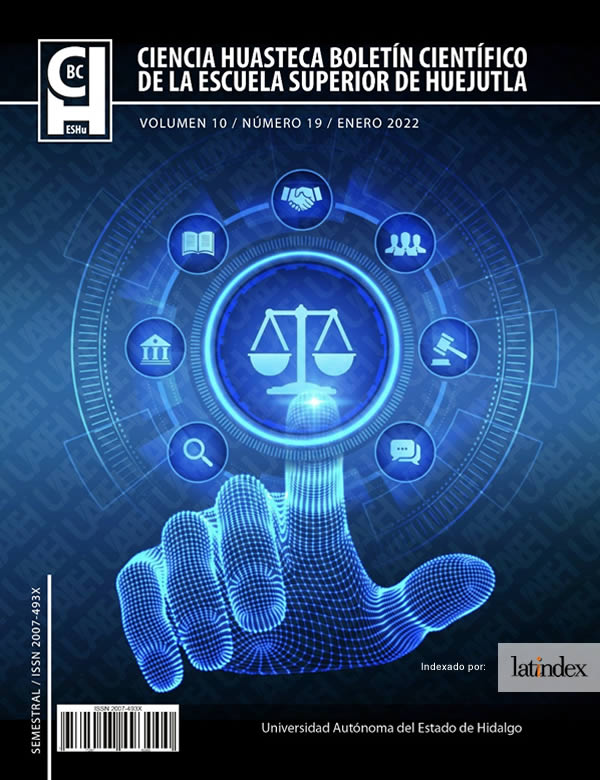Revisión sistemática de la implementación de Blockchain en el sector educativo
DOI:
https://doi.org/10.29057/esh.v10i19.8327Palabras clave:
Blockchain, sector educativo, revisión sistemática, tecnología BlockchainResumen
En esta investigación se presenta un proceso de revisión sistemática de la implementación de la tecnología Blockchain en el sector educativo. De manera particular, la investigación se centra en identificar las implementaciones realizadas a través de Blockchain en los últimos años. En los resultados se observa que existen oportunidades de aplicación de la tecnología en el sector educativo. Además, la poca implementación de Blockchain en el sector educativo, inspira a trazar líneas futuras para beneficiar las áreas de gestión de pagos, registro de estudiantes, entre otras mencionadas al final del documento.
Descargas
Citas
Barbara Kitchenham. (2014). Procedures for Performing Systematic Reviews. Keele University Technical Report, 33(2004), 1–26.
Barraza, Í. D., & Zepeda, V. V. (2017). Factores sociales y humanos que afectan el proceso de educción de requerimientos: Una revisión sistemática. RISTI - Revista Iberica de Sistemas e Tecnologias de Informacao, 24(24), 69–83. https://doi.org/10.17013/risti.n.69-83
Camilleri, A., & F., G. A. (2017). Utilizing Blockchain Technology for Settlement in a Microgrid. In I. dos Santos (Ed.), Jrc Science for Policy Report (Issue June). https://doi.org/10.2760/60649
Chang, S. E., Luo, H. L., & Chen, Y. (2020). Blockchain-enabled trade finance innovation: A potential paradigm shift on using letter of credit. Sustainability (Switzerland), 12(1), 1–16. https://doi.org/10.3390/su12010188
Chen, G., Xu, B., Lu, M., & Chen, N.-S. (2018). Exploring blockchain technology and its potential applications for education. Smart Learning Environments, 5(1), 1. https://doi.org/10.1186/s40561-017-0050-x
Cong, L. W., & He, Z. (2019). Blockchain Disruption and Smart Contracts. Review of Financial Studies, 32(5), 1754–1797. https://doi.org/10.1093/rfs/hhz007
Funk, E., Riddell, J., Ankel, F., & Cabrera, D. (2018). Blockchain technology: A data framework to improve validity, trust, and accountability of information exchange in health professions education. Academic Medicine, 93(12), 1791–1794. https://doi.org/10.1097/ACM.0000000000002326
Grossi, L., & Calvo-Manzano, J. A. (2011). Análisis de decisiones en la selección de proveedores de tecnologías de la información: Una revisión sistemática. RISTI - Revista Iberica de Sistemas e Tecnologias de Informacao, 8, 67–79. https://doi.org/10.4304/risti.8.67-79
Gupta, S., Malhotra, V., & Singh, S. N. (2020). Securing IoT-driven remote healthcare data through blockchain. In Lecture Notes in Networks and Systems (Vol. 94, pp. 47–56). Springer. https://doi.org/10.1007/978-981-15-0694-9_6
Jirgensons, M., & Kapenieks, J. (2018). Blockchain and the Future of Digital Learning Credential Assessment and Management. Journal of Teacher Education for Sustainability, 20, 145–156. https://doi.org/10.2478/jtes-2018-0009
Karale, A. S., & Khanuja, H. (2019). Implementation of blockchain technology in education system. International Journal of Recent Technology and Engineering, 8(2), 3823–3828. https://doi.org/10.35940/ijrte.B2462.078219
Lizcano, D., Lara, J. A., White, B., & Aljawarneh, S. (2020). Blockchain-based approach to create a model of trust in open and ubiquitous higher education. Journal of Computing in Higher Education, 32(1), 109–134. https://doi.org/10.1007/s12528-019-09209-y
Mohan, V. (2019). On the use of blockchain-based mechanisms to tackle academic misconduct. Research Policy, 48(9), 103805. https://doi.org/10.1016/j.respol.2019.103805
Ocheja, P., Flanagan, B., Ueda, H., & Ogata, H. (2019). Managing lifelong learning records through blockchain. Research and Practice in Technology Enhanced Learning, 14(1), 4. https://doi.org/10.1186/s41039-019-0097-0
Palma, L. M., Vigil, M. A. G., Pereira, F. L., & Martina, J. E. (2019). Blockchain and smart contracts for higher education registry in Brazil. International Journal of Network Management, 29(3), e2061. https://doi.org/10.1002/nem.2061
Pfeiffer, A., & Koenig, N. (2019). Blockchain Technologies and Their Impact on Game-Based Education and Learning Assessment. In Savegame. Springer VS, Wiesbaden. https://doi.org/10.1007/978-3-658-27395-8_5
Sun, H., Wang, X., & Wang, X. (2018). Application of blockchain technology in online education. International Journal of Emerging Technologies in Learning, 13(10), 252–259. https://doi.org/10.3991/ijet.v13i10.9455
Turkanović, M., Hölbl, M., Košič, K., Heričko, M., & Kamišalić, A. (2018). EduCTX: A blockchain-based higher education credit platform. IEEE Access, 6, 5112–5127. https://doi.org/10.1109/ACCESS.2018.2789929
Vargas, P. R., & Soriano, C. L. (2019). Blockchain in the university: A digital technology to design, implement and manage global learning itineraries. Digital Education Review, 0(35), 130–150. https://doi.org/10.1344/der.2019.35.130-150
Wanotayapitak, S., Saraubon, K., & Nilsook, P. (2019). Process design of cooperative education management system by cloud-based blockchain E-Portfolio. International Journal of Online and Biomedical Engineering, 15(8), 4–17. https://doi.org/10.3991/ijoe.v15i08.10374
Williams, P. (2019). Does competency-based education with blockchain signal a new mission for universities? Journal of Higher Education Policy and Management, 41(1), 104–117. https://doi.org/10.1080/1360080X.2018.1520491
Zhao, W., Liu, K., & Ma, K. (2019). Design of Student Capability Evaluation System Merging Blockchain Technology. Journal of Physics: Conference Series, 1168(3), 32123. https://doi.org/10.1088/1742-6596/1168/3/032123















